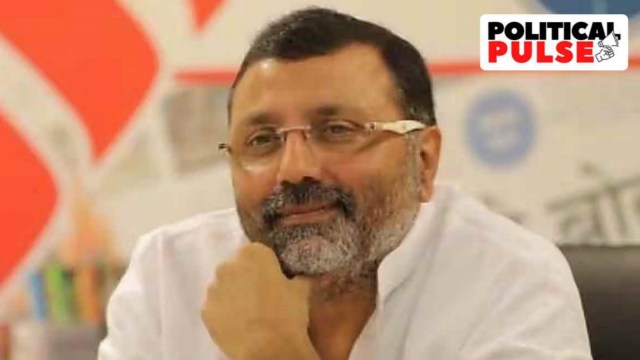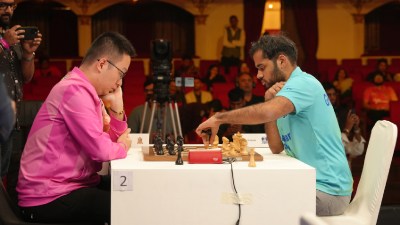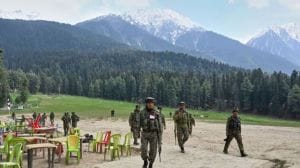BJP MP Nishikant Dubey, a member of the Joint Committee of Parliament on the Waqf (Amendment) Bill, has written to panel chairperson Jagdambika Pal raising “serious concerns about the massive number of submissions” received on the issue and seeking an investigation, including into “the geographical origin” of the submissions, by the Union Home Ministry.
Dubey alleged that “fundamentalist groups”, “individuals like Zakir Naik”, or “foreign powers like the ISI (Pakistan) or China or their proxies” may be involved given that “1.25 crore submissions have been received”. If such forces were involved, Dubey said, it would be an attempt “to manipulate our legislative process”, “an attack on the very foundations of our parliamentary system” and “must be treated as a national security issue”.

The Joint Committee on the Waqf Bill, which was introduced in the last Parliament Session and proposes sweeping changes in how waqfs are governed and regulated, has had 12 meetings so far, with the last one on September 20. The stakeholders called for consultations include the All India Muslim Personal Law Board (AIMPLB), Union Ministries of Housing and Urban Affairs, Archaeological Survey of India, Zakat Foundation of India, and several state waqf boards.
Speaking to The Indian Express, the AIMPLB said that as part of a campaign by it inviting representations from people, “5 crore” had sent their opinion to the parliamentary committee. The board has maintained a complete record of the emails sent, AIMPLB spokesperson S Q R Ilyas said, adding that while over 3.7 crore emails have been sent to the committee via a QR code generated by it, other 1.3 crore opinions were sent via other mediums such as post and courier.
In case the Joint Committee wanted copies of these emails, the AIMPLB was prepared to submit them as proof of the correspondence sent, Ilyas said.
In his letter to Pal, Dubey wrote: “This unprecedented volume (of submissions) not only sets a global record for legislative submissions, but it also invites scrutiny over the motivations and sources… it is vital that the committee addresses these concerns head-on to ensure the integrity and independence of our legislative process.”
He said that the first issue that requires “immediate attention” is the geographical origin of these submissions. “It is crucial to determine how many came from within India and how many were received from international sources,” Dubey wrote, adding that “it is statistically improbable that such an overwhelming response could emerge organically from within India alone”.
Story continues below this ad
Saying that “the content of a large portion of these submissions is identical or contains minor variations”, Dubey wrote, “a larger and more serious issue is the possible involvement of Islamic fundamentalist organizations”.
He went on to name Islamic preacher Zakir Naik “and his ilk”, calling them “inimical to our vibrant democracy”, and suggested “the involvement of foreign actors such as Pakistan’s ISI, China, and radical organizations like Jamaat-e-Islami Bangladesh and the Taliban”. “If foreign intelligence agencies are behind this flood of submissions, it would constitute an unprecedented attack on Indian sovereignty and a deliberate attempt to compromise the independence of Parliament,” Dubey wrote.
Asking Pal to advise the Home Ministry to “immediately conduct a thorough investigation”, he said the findings should be circulated to all members to ensure transparency.
The AIMPLB said it had circulated a QR code on August 31 urging people to send their opinion to the parliamentary panel. Anyone scanning the QR code is led to an online petition rejecting the Waqf Bill, which he or she can sign on and forward to the email address of the panel, with the AIMPLB receiving a copy.
Story continues below this ad
Ilyas said that the AIMPLB has also been holding conferences on the Bill across cities, where it details how the proposed legislation will change laws governing waqf properties.
The Opposition parties had earlier slammed the proposed amendments as “unconstitutional”, “anti-minority” and “divisive”.
On Wednesday, asked about the letter by Dubey during a press conference at AICC headquarters, Congress spokesperson Shaktisinh Gohil said “the BJP is making fun of democracy”. “If in such a big country, only 1.5% of the people express their opinion and they (the BJP) are pained by it, then it is clear that they don’t believe in democracy.”
Asked about Dubey’s letter at another press meeting, Union Minister for Parliamentary Affairs and Minority Affairs Kiren Rijiju refused to comment on it. At the same time, he added: “The news I have heard about the Joint Committee is very positive. More than one crore representations have come. It is hearing everyone… government organizations, social ones… I think such an extensive parliamentary committee hearing hasn’t happened in the past… When we formed it (the Joint Committee), we empowered it. Now, emails, and under what circumstance they have been sent, this will only be seen by the committee. We will give support.”
Story continues below this ad
On whether the committee would be able to conclude its work by the time the Winter Session begins, Rijiju said: “The way it is functioning, it should be able to table the report as deputed in the rules in the term of reference. Before the last day of the first week of the Winter Session, they will fulfill it.”


































